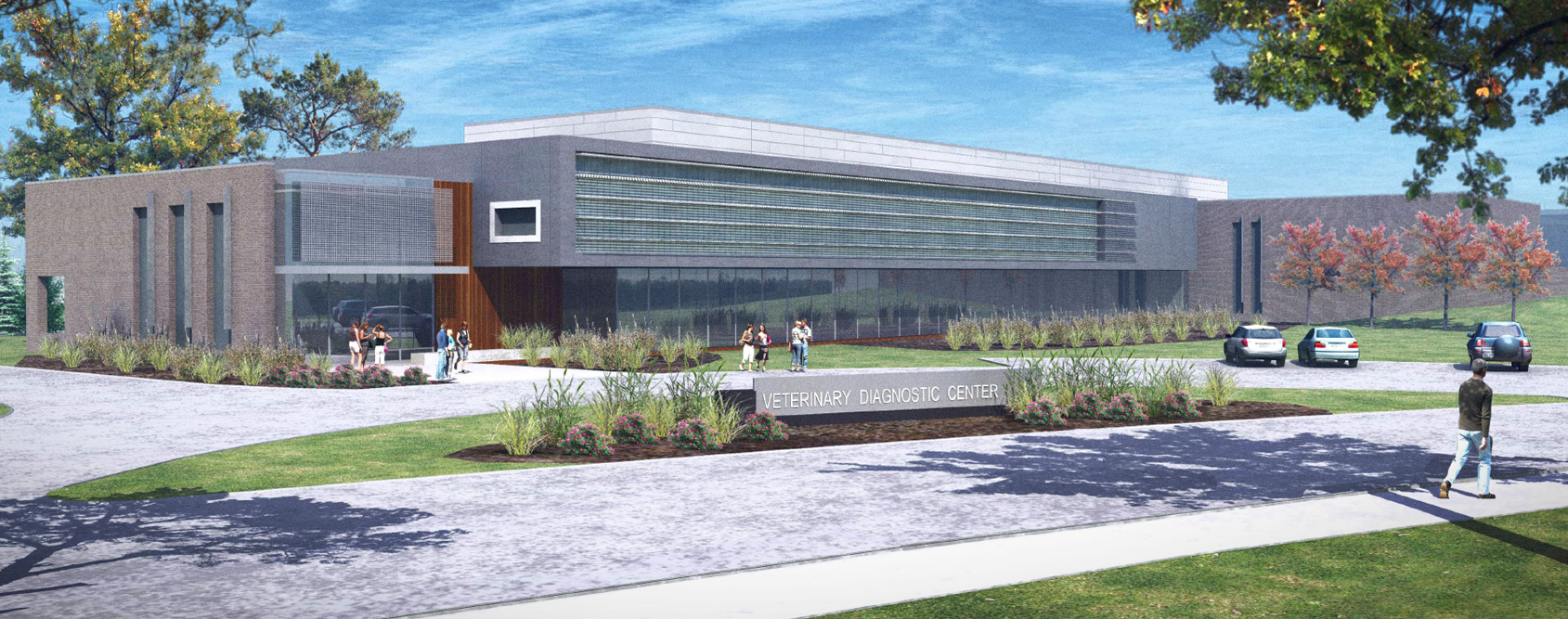
To help ensure livestock producers and others have access to the best available laboratory diagnostics, research, education and outreach services, Farm Credit Services of America has given $100,000 to support a new Veterinary Diagnostic Center at UNL.
The gift made to the University of Nebraska Foundation supports plans to replace an aging facility that no longer meets modern laboratory standards. The new facility planned to replace it will enable the university to better serve veterinarians, livestock producers, public health officials and others in Nebraska and around the country who depend on its services.
Recognizing the state's need for a new center, the Nebraska Legislature committed to provide $41.5 million in funding through the Building a Healthier Nebraska initiative once $4.15 million is first raised from private sources. To date more than $1 million has been raised, and the university hopes to complete fundraising this summer.
Bob Campbell, senior vice president of Farm Credit Services of America, said the company is pleased to help support this effort, which stands to benefit generations of livestock producers and agriculture research programs.
"Livestock producers need access to cutting-edge diagnostics," Campbell said. "Considering the economic impact of the livestock industry in Nebraska, we want to help producers keep their animals as healthy as possible."
Alan Doster, professor and director of the Veterinary Diagnostic Center, said the university appreciates the gift and efforts by Farm Credit Services of America to bring attention to the need for a new center.
"We are very thankful for the company's generous support," Doster said. "Its investment will be well used and will help ensure we're able to provide a high level of service to livestock producers and veterinarians in Nebraska and across the country."
Built in 1975, the Veterinary Diagnostic Center on UNL's East Campus has become outdated. According to an accreditation review last year by the American Association of Veterinary Laboratory Diagnosticians, there is a need for facility upgrades and additional space to continue its responsiveness in the development and implementation of new technologies and to address biosafety and biosecurity concerns, or the center may face loss of accreditation.
The center provides testing services to professionals and organizations across the nation and is considered a national center of excellence for testing of certain diseases in livestock, which is important for keeping them healthy.
In addition to serving livestock producers, the Veterinary Diagnostic Center provides training for large animal veterinarians, a profession currently in demand in Nebraska. The center provides these future doctors with hands-on experience by studying specimens from current, real life animal cases. University faculty instructors and researchers conduct tests and perform research in the center that affects agriculture across the country.
The center is also a diagnostic resource for most small animal veterinarians in Nebraska who use the laboratory's services for quick turnaround and accurate testing of diseases specific to family pets.
Public health officials in Nebraska even rely on the Veterinary Diagnostic Center to help protect the health of humans through diagnostic testing of certain diseases that can transfer from animals to humans, such as rabies, West Nile, H1N1 and others. The center provides disease surveillance, develops new diagnostic testing methods, conducts infectious disease research and supports continuing education programs.
"The Veterinary Diagnostic Center touches the local community, the livestock industry, the university and the state of Nebraska in various ways," Campbell said. "We're excited to make an impact at so many levels and would encourage others to support this important effort as well."
The gift from Farm Credit Services of America also provides support to the University of Nebraska's current fundraising initiative, the Campaign for Nebraska: Unlimited Possibilities, and a top priority to increase support for agriculture and life sciences.
— Robb Crouch, NU Foundation